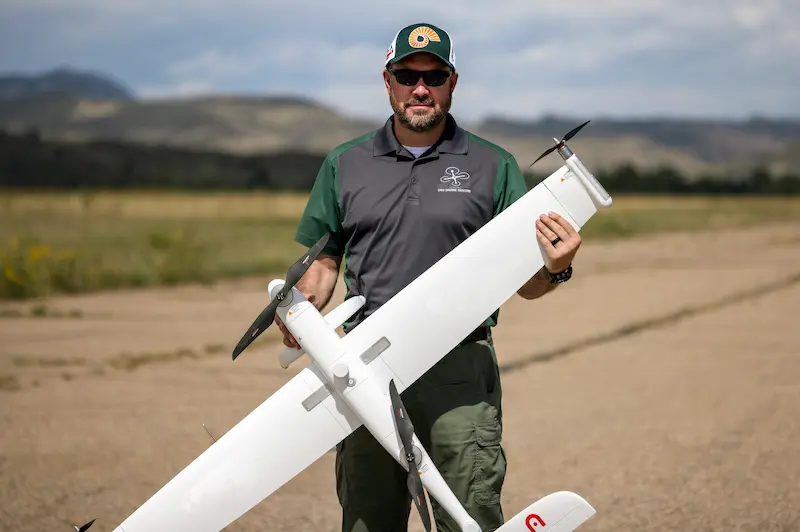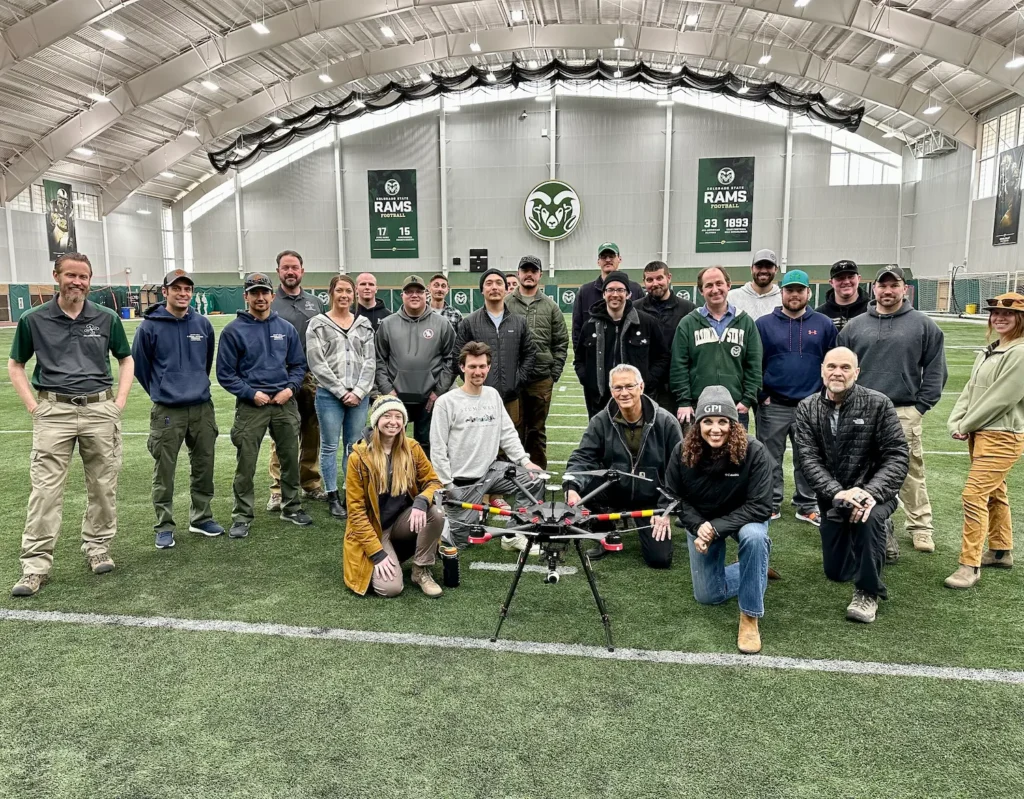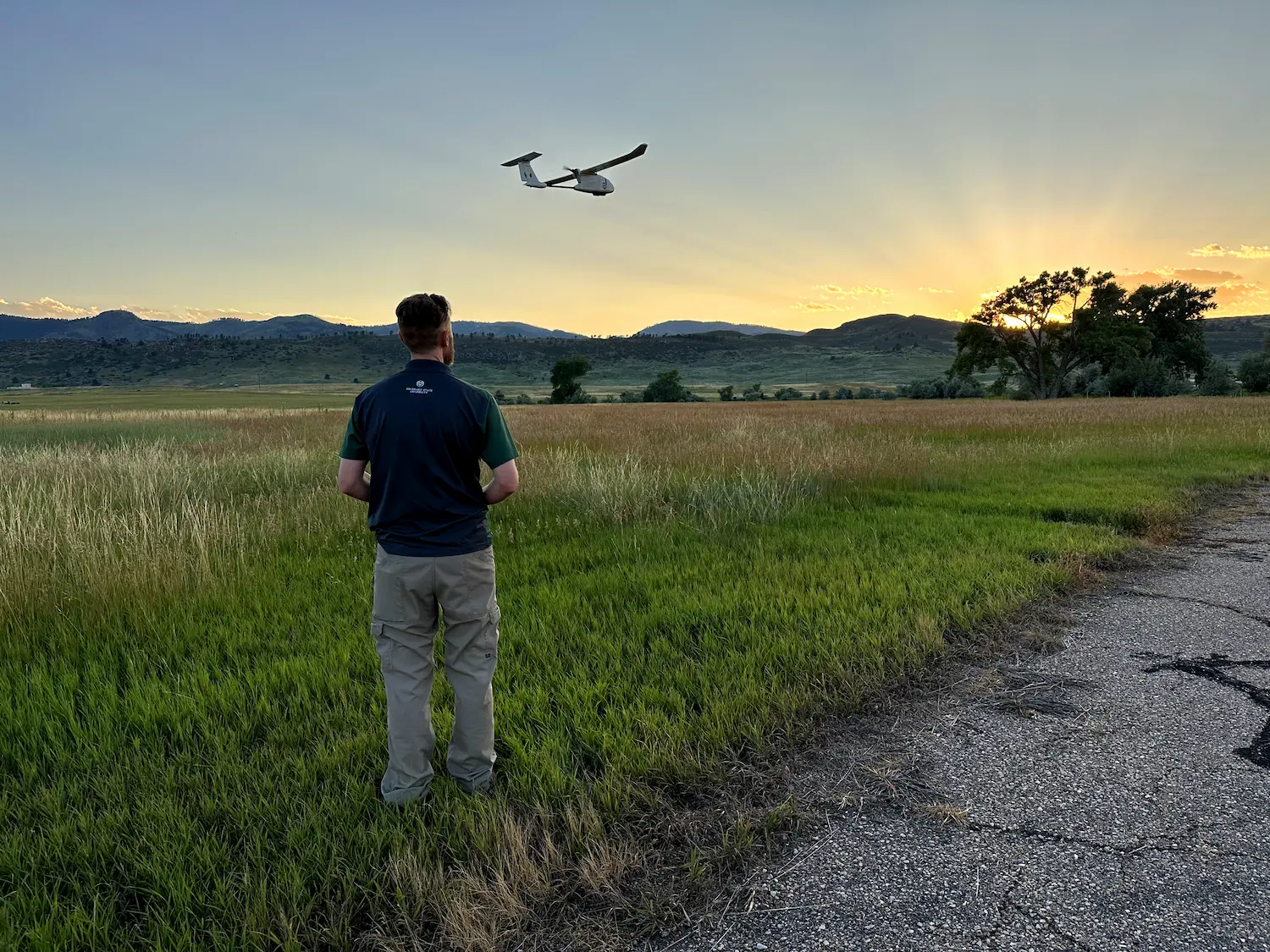The Colorado State University (CSU) Drone Center assists researchers, industry partners, public safety professionals and a wide range of students with cutting-edge UAV research, education and support services. As a leading hub for drone technology, the center empowers these stakeholders to push the boundaries of drone applications. From pioneering research projects to comprehensive pilot training programs, the CSU Drone Center aims to shape the future of drone technology across the industry. Discover how this full-service drone hub has removed barriers to drone-enabled research and education and fostered a collaborative community of experts to provide unparalleled resources for aspiring remote pilots, researchers and global leaders.
Pioneering UAV Research: The Birth of CSU Drone Center
The CSU Drone Center emerged in 2017 in response to the rapidly changing landscape of drone technology. As aircraft, systems and sensors evolved, CSU recognized the need for a centralized unit to address the multifaceted challenges faced by researchers who wanted to utilize this technology.
At the time, researchers were faced with a multitude of challenges, including ensuring legal compliance, navigating ethical considerations, mitigating liability risks and understanding insurance requirements. The need to address and manage these concerns with a dedicated team of experts ultimately led to the establishment of the CSU Drone Center.
Christopher Robertson leads the center. He brings 24 years of experience at Colorado State University, 20 years in law enforcement, and over 9 years of expertise in UAS operations and training to bear on his role as the Drone Center Director. Chris is an accomplished pilot across many different platforms of UAS, and holds a private pilot certificate as well.
Today, Robertson and his team helps the center’s constituents navigate the labyrinth of complex FAA regulations and local laws. They ensure responsible drone use in research and assist in the implementation of safety protocols, best practices and mitigation measures. They also offer specialized facilities, approval authorities, equipment and training. As a result, the CSU Drone Center has become an invaluable resource for the university and the larger drone community.
Cutting-Edge Drone Research: CSU’s Innovative UAV Applications

The CSU Drone Center supports a wide range of bleeding-edge research applications. These range from supporting methane emission research by sensor integration and flight planning, mapping of research crops to develop more disease/drought resistant plants, and documenting hydro-morphological changes in post wildfire landscapes.
By bridging the gap between academic research and global industry requirements, the center has proven the return on investment (ROI) for drone usage for sustainable energy practices.
Dr. Alwaseela Hassan’s work in precision agriculture and plant phenomics provides yet another example of groundbreaking drone-enabled research at CSU. Hassan’s innovative project combines drones, hyperspectral remote sensing, and artificial intelligence (AI) to revolutionize crop monitoring and management.
Dr. Hassan’s team developed deep learning models to ensure data consistency across different drone flights and environmental conditions. This advancement allows for reliable comparisons of drone-collected data over time and addresses a major challenge in long-term agricultural monitoring. The research integrates multiple data sources and scales, from leaf to canopy level and also utilizes sophisticated deep learning models that combine convolutional neural networks with Long Short-Term Memory (LSTM) (a type of recurrent neural network (RNN)). This comprehensive method helps to detect plant nutrient deficiencies and diseases, as well as to improve yield prediction accuracy. Hassan’s team compressed these complex deep learning models for use on drones and other edge devices to enable sophisticated AI analysis directly in the field. This offers farmers and researchers deeper insights into crop health, more accurate yield predictions, and optimized resource use.
Just these two transformative research projects at CSU’s Drone Center promise to play a crucial role in promoting global sustainable energy and food sustainable agricultural practices.
Advanced UAV Development and Integration at CSU Drone Center

The center’s capabilities extend to advanced unmanned aerial vehicle (UAV) development and customization to offer researchers access to the most advanced drone technology. The CSU Drone Center offers:
- Custom UAV design, prototyping and configuration
- Collaboration with College of Engineering and computer science experts
- Tailored drone solutions for specific research requirements
- Bespoke UAV systems designed and built in-house for a wide range of applications
- Advanced sensor integration
- Incorporation of multispectral sensors for enhanced data collection
- High-resolution camera integration for detailed aerial imaging
- Seamless integration of off-the-shelf systems with specialized components
- Software integration, including customized drone control and data processing
- Micro-controller programming: optimized UAV performance and functionality
- Geospatial data referencing: Precise location mapping and analysis
- 3D Printing: Rapid prototyping of custom drone components
When researchers require specialized drones for their projects, the CSU Drone Center frequently collaborates with the CSU Walter Scott, Jr. College of Engineering and College of Computer Science to create prototype designs and build bespoke systems. Beyond custom builds, the CSU Drone Center excels in integrating commercial-off-the-shelf (COTS) systems with advanced sensors and capabilities, such as custom mounting solutions, multispectral sensors and high-resolution cameras. This holistic design-build-integrate approach empowers researchers to utilize locally-supported state-of-the-art tools for groundbreaking projects across various disciplines.
Complex Drone Testing, Operations and Support at Christman Airfield & Beyond
The CSU Drone Center also offers researchers and industry partners access to a premier drone testing facility at Christman Airfield. This top-tier testing site features a 4000 ft. asphalt runway in Class G airspace and two aircraft hangars for drone storage and maintenance, all nestled in an expansive 400 acres of secure, fenced landscape located near CSU’s world-renowned Methane Emissions Testing and Evaluation Center (METEC) research facility.
Christman field also boasts an on-site solar farm for sustainable operations, a cell tower to enable advanced telemetry and data transmission and beyond visual line of sight (BVLOS) capabilities. (Fun fact: the CSU Drone Center was the 16th organization nationwide to receive BVLOS authorization from the FAA for Christman Airfield).
Relating to BVLOS approvals, some of the most valuable services the CSU Drone Center provides are centered around regulatory and logistical support for a variety of challenging drone missions. The center’s team has experience not only in authoring custom BVLOS waivers but also in planning missions with expensive and sophisticated aircraft while ensuring safe operations in demanding conditions.
The CSU Drone Center team also has extensive experience operating in diverse environments, from high-altitude flights at 13,000 feet to complex urban settings, confined spaces and industrial facilities. One of their notable early achievements was to navigate the airspace authorization process to fly UAV systems during NCAA Division 1 football games at the CSU Canvas stadium, where the Drone Center team was among the first organizations in the country to provide lawfully-flown UAV operations over people and aerial video transmission for use on the video board systems and broadcast feed. This capability has elevated the fan experience and allow spectators to experience drone-enhanced athletic events on both TV and through Mountain West Conference broadcasts.
The Center’s expertise also extends to supporting local first responders and rescue departments across the state. They provide valuable advice, training, and assistance in integrating drone technology into emergency response operations.
All in all, the Drone Center’s people and facilities support a wide range of drone technology development and applications across various sectors including long-range flight testing, environmental monitoring experiments, UAV sensor integration and calibration, as well as drone pilot training and certification. This one-of-a-kind drone testing facility cements CSU’s position as a leader in drone research and innovation.
CSU Flight School & More: Pioneering Drone Education and Workforce Development
The CSU Drone Center stands at the forefront of drone education. It offers comprehensive training programs that bridge the gap between theoretical knowledge and practical skills. Drone Center Associate Director Adam Smith leads the center’s public-facing education programs and workforce development efforts and brings over 20 years of teaching and vocational instruction experience to the classroom and the flight line.
Recognizing the need for hands-on drone education, the CSU Drone Center established the CSU Drone Flight School. This comprehensive program has trained over 1,300 pilots throughout their various programs which include engaging classroom sessions, technical exploration and hands-on flight time. The robust curriculum combines preparation for the FAA Part 107 certification with in-person flight instruction and a final “check ride” style trajectory to assess piloting abilities. Not only do the Center’s graduates become certified as remote pilots, but they also emerge as safe, confident, proficient operators who can mission-plan and operate in the real world.
The CSU Drone Center’s educational efforts extend beyond its flight school. Utilizing support from CSU and from the FAA through workforce development grants, the Center expanded to offer UAV education seminars to both junior high and high school students across Colorado. The Center also hosts an advanced Public Safety UAV Operations training seminar, a unique three-day intensive course offering scenario-based live-action training for emergency personnel, one that simulates real-world UAV applications in critical situations. As retired Colorado law-enforcement officers, Smith & Robertson have over 40 years of combined experience and subject matter expertise in the public safety arena, all of which they draw upon when developing curriculum for first responders.
Through its innovative CSU Drone Flight School and targeted workforce development initiatives, the center aims to shape the future of the drone industry.
Tap Into the Future Direction of CSU’s World Class Research and Industry Partnerships
The CSU Drone Center will continue to actively push the boundaries of drone technology and applications into the future. Some of their ongoing projects include:
- Subsurface Imaging Technology Center: In collaboration with industry partners, the Center is establishing a standardized testing site for various underground targets and objects, including unexploded ordnance (UXO).
- Aircraft Integration and Modification: The Center serves as a hub for custom aircraft modification and sensor integration. They do this by utilizing skilled engineering and computer science students at CSU under the direction of the talented staff of the Center
- Industry Testing Partnerships: The Center is positioning itself to become an official U.S. testing facility, pending the FAA’s reopening of applications for such designations.
The CSU Drone Center appears to be living up to its tagline: “Innovation from the ground up.”
It will undoubtedly remain at the forefront of UAV research, education and innovation.
For those interested in learning more about its practical drone education, diverse research applications and cutting-edge testing facilities, contact: Christopher Robertson at christopher.robertson@colostate.edu.

